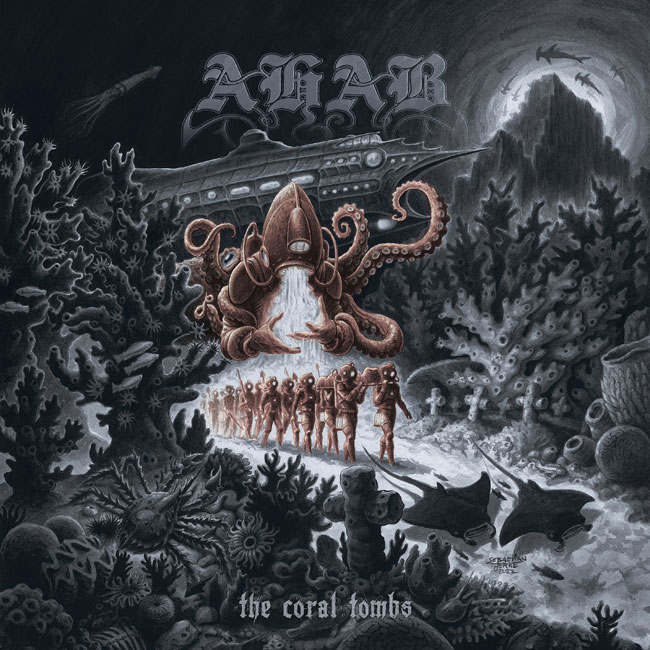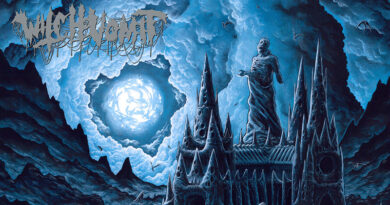Review: Ahab ‘The Coral Tombs’
Herman Melville’s epic classic Moby Dick is an often terrifying story that takes the backdrop of the nineteenth-century Nantucket whaling industry. Allegedly inspired by events surrounding the real-life horrors that befell the lost ship Essex, it paints a captivating story of human hubris and obsession.

Having studied the tome at university, whilst I could go my entire existence again without having to trawl through pages of descriptions regarding whales, the dark themes of the human psyche, madness and despair in the allegorical tale of Captain Ahab’s search to kill the titular sea beast are heavy and fascinating.
I am not alone in finding this and the epically heavy German quartet Ahab, the finest purveyors of their own genre (Nautik Doom) being inspired by the greatest maritime novel of all time have set about their eighteen-year career sound tracking these lofty and watery concepts with slabs of turbulent and bleak funeral doom, beginning with their The Call Of The Wretched Sea debut in 2006.
Drawn inexorably back to the literally ocean once more, the band return after a seven-year absence from the studio and continue their obsession, they have found their muse this time in Jules Verne’s 2000 Leagues Under The Sea.
Retaining much of the progression to their sound that was made with 2015’s The Boats Of The Glen Carrig, it is still somewhat of a shock that Prof. Arronax’ Descent Into The Vast Oceans opens with blastbeats and death metal growls which serve to reaffirm the band’s commitment to making music that is not only heavy on atmosphere but sonically matches the depth, complexity and power of the churning seas.
Following the violent transition from the choppy surface waves that have made up most of their previous works, the band sink into the calmer and darker world below the surface as they slow the pace to create a moodier, slower passage more associated with their brand of funeral doom. Unlike the triumphant works of Pallbearer, Ahab bring introspection and an air of melancholy as Daniel Drosrte’s vocals switch from monstrous growls and screams to mournful clean laments.
Over the course of the last two decades, the band have excelled at blending the heavier elements of their sound with phases of post-rock progressive ambience whilst attempting to convey a conceptual narrative. One doesn’t have to be a fan of nautical fiction to appreciate what Ahab do though and as the journey continues on Colossus Of The Liquid Graves, the gloomy and powerful rolling motion of the music swings from pummelling heavy riffs to stately and melodic leads.
By the very nature of the genre, The Coral Tombs is a dirge; one that reflects not only the surface story of Nemo’s tragic wanderings and the misfortune that befall his crew mates,but also the subtext and juxtaposition of the humanity, the power and (self) destruction contained within.
not only heavy on atmosphere but sonically matches the depth, complexity and power of the churning seas…
Mobilis In Mobili has an extended passage of sinister, eery ambiance that heralds a growing uneasy sense of things coming unravelled, and the almost tribal, ringing string bends that progress The Sea As A Desert invoke a sense of beautiful serenity that should calm you, but don’t.
Much like epic doom maestros Candlemass, the band have struck the balance between a sense of momentum to their music that stops short of being overpowering and the tonal clarity of the production remains, whether they are caressing you with delicate hymnal harmonies or dragging you to the depths.
Sonically, the band’s evolution is often tied to the story they are telling and on The Coral Tombs they move unrelentingly, but glacially through the shifts between heaviness that feels appropriate for representing a massive, unyielding body of water, to the serene, oppressive depths with an almost psych rock exploration. The dual guitars of Droste and Christian Hector drive this album with subtle dexterity that resonate with purity on the more atmospheric and moodier passages, best showcased on the crawling title track and crunch with tidal force on the weighty moments of savagery.
The hour-plus running time stretches their fifth album into what feels like epic proportions, even by Ahab’s standards, and during the many meandering passages, it is easy to lose sense of where you are in any narrative and just immerse yourself in the prog noodling.
As the story heads towards the final act, Ægri Somnia, the longest track on the album, moves from a light instrumental into the territory of deathly growls and back again, feeling like an epic in its own right, and as such, there is a danger that The Coral Tomb feels like an extremely rich meal or that time I drank eight pints of Guinness on St Patrick’s day to win a novelty hat.
By the time the band reach the climax of The Mælstrom with the majestic and the seismic blended effortlessly into ten minutes that perfectly sum up the album, the undeniable takeaway is that this is the band’s strongest effort for some time. That is not a slight on previous albums in any way, but this feels more consistent throughout, despite the fact that some of the musical progress sees the band moving away from the more traditional concept of funeral doom that has defined them during their career.
In fact, there are large sections of The Coral Tombs that does not feel like a typical ‘doom’ album at all and many elements don’t fit the description, highlighting their musical expansion that understandably has taken place in the longest gap between releases in their history, to no detriment at all.
Ahab have served up an album that will undoubtedly challenge the listener and it is one that requires (and deserves) repeated revisiting to appreciate. It is long, it is dense, but in spite of that, it is unmistakeably Ahab awash with ideas which is no bad thing.
Label: Napalm Records
Band Links: Official | Facebook | Bandcamp | Twitter | Instagram
Scribed by: Mark Hunt-Bryden


